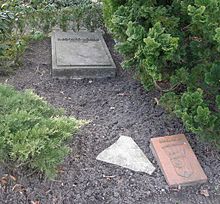Siegfried Borris
Siegfried Borris (born November 4, 1906 in Berlin as Siegfried Jakob Borris Zuckermann ; † August 23, 1987 ibid) was a German composer , musicologist and music teacher.
Life
Years of training and first lectureship
Borris was born on November 4, 1906 as the son of the economist Salomo Zuckermann and his wife Martha, a teacher, in Berlin . His father converted from Jewish to Christianity in 1905 on the occasion of his wedding to Borris' Protestant mother. Borris also initially studied economics , but turned in 1927 a music and studied composition with Paul Hindemith to. From 1929 he also studied musicology at Friedrich Wilhelm University and received his doctorate in 1933 as an academic student of Arnold Schering .
As early as 1929 he worked as a lecturer at what was then the State Academic University of Music in Berlin. After the transfer of power to Adolf Hitler in 1933, however, he was expelled from the university and unemployed at the instigation of the Combat League for German Culture . After that he was only allowed to work as a private music teacher and when the race laws came into effect in 1935, Borris lost his German citizenship again , which he had only been granted in 1925 because of his Russian-born father. He subsequently remained a stateless person until 1950 .
After 1945
It was not until 12 years later, in 1945, that he was able to return to the university, where he took over a professorship as well as the establishment and management of the teachers' seminar. He was interested in school music, young musicians and the popularization of new music. For example, he composed school and fairy tale operas and wrote radio programs in which he popularized modern works. As a member of the program advisory board, Borris advised the former broadcaster Free Berlin on programming issues. For many years he was President of the Association of German Music Educators and Performing Artists and, until 1976, member and president of the German Music Council and Chairman of the "Institute for New Music and Music Education" in Darmstadt . He also held a leading position in the “Working Group on Music Education and Music Care”.
Compositional work
As a composer, Siegfried Borris wrote five symphonies , suites and divertimenti, concerts for harpsichord and flute , organ music and cantatas . Some works for plucked orchestra are also by Borris. The focus of his compositional work, however, was in the field of youth opera and all kinds of game music, such as for the accordion . In addition to his compositions, Siegfried Borris also published numerous works on music theory.
Honors
- 1972: Cross of Merit 1st Class of the Federal Republic of Germany
- 1986: Great Cross of Merit of the Federal Republic of Germany
- In 1981 Siegfried Borris was honored with the Ernst Reuter plaque from the city of Berlin.
- Siegfried Borris was laid to rest in the Dahlem cemetery . His grave was dedicated as an honor grave in Berlin until 2014 .
Works (selection)
- Compositions
- Chamber music for almost all instruments and instrument combinations
- 8 studies for accordion
- Allegretto for accordion
- Allegro moderato for accordion
- Sonatina for violin and accordion
- Small evening music for plucked orchestra
- Elevator = spring journeyman for plucked orchestra
- Symphony No. 1 in B minor op.19
- Orchestral suite op.25
- Symphony No. 3 in A major op.29
- 3 small [sic] suites for piano op. 31 (1942)
- Songs and Sentences for Singing and Playing, op.38 (1947)
- Concertino for English horn and string orchestra op.48
- Intrada for accordion orchestra in C major op.57
- Rural suite - play music for "Brother Singer" for three wind instruments and strings
- Symphony No. 4 in E major, Op. 60
- Symphony No. 5 in C sharp minor, Op. 61
- Concerto for viol, 3 woodwinds and string orchestra op.87
- Villanelles for flute , violin and violoncello op.97
- Concerto for Organ and Small Orchestra, Op. 110
- Concerto for orchestra in one movement, op.112
- Concerto for soprano saxophone and orchestra op.120 (1966)
- Seals
- Autumn break. Poems. Printed as a manuscript. 47 pages, undated
- The ringing circle. Poems. Printed as a manuscript. Berlin 1938
- Way and turn. Poems. Printed as a manuscript. 1941
- Fonts
- Contributions to a New Music Studies , 1947/48
- Practical harmony theory , Berlin 1950
- Introduction to Modern Music , Halle 1950
- The key to today's music
- Basics of musical environmental studies
- Culture as a mass product
- In Praise of Music Das Musikschulwerk Vol. 4 , Berlin / Leipzig 1950
- Good night, dear children , Berlin 1952 (children's song book)
literature
- Tobias Knickmann: Siegfried Borris . In: Claudia Maurer Zenck, Peter Petersen, Sophie Fetthauer (ed.): Lexicon of persecuted musicians from the Nazi era . University of Hamburg, Hamburg 2016 ( online )
Web links
- Works by and about Siegfried Borris in the catalog of the German National Library
- Siegfried Borris Archive in the Archive of the Academy of Arts, Berlin
- siegfriedborris.de Website of his 2nd wife about the artist
Individual evidence
- ^ Tobias Knickmann: Siegfried Borris - personal data . On July 28, 2017 from lexm.uni-hamburg.de , accessed on April 23, 2019
- ↑ Tobias Knickmann: Siegfried Borris - Biography . On July 28, 2017 from lexm.uni-hamburg.de , accessed on April 23, 2019
| personal data | |
|---|---|
| SURNAME | Borris, Siegfried |
| ALTERNATIVE NAMES | Zuckermann, Siegfried Jakob Borris |
| BRIEF DESCRIPTION | German composer , musicologist and music teacher |
| DATE OF BIRTH | November 4, 1906 |
| PLACE OF BIRTH | Berlin |
| DATE OF DEATH | 23rd August 1987 |
| Place of death | Berlin |
